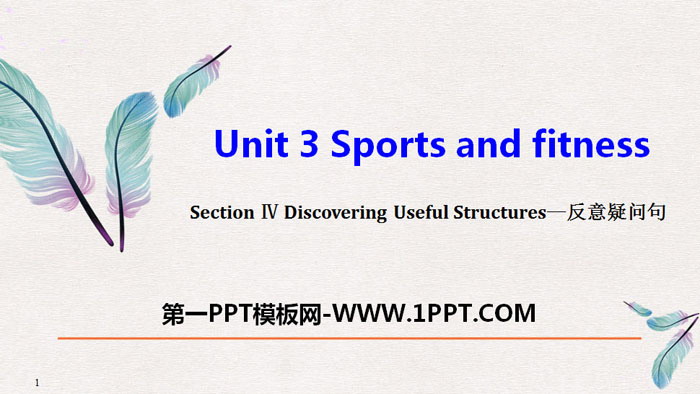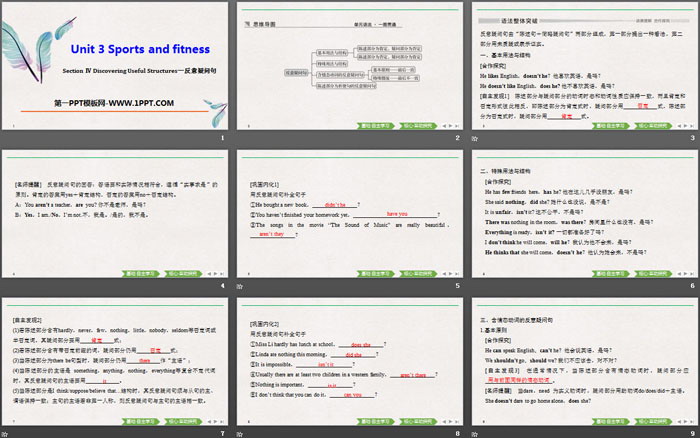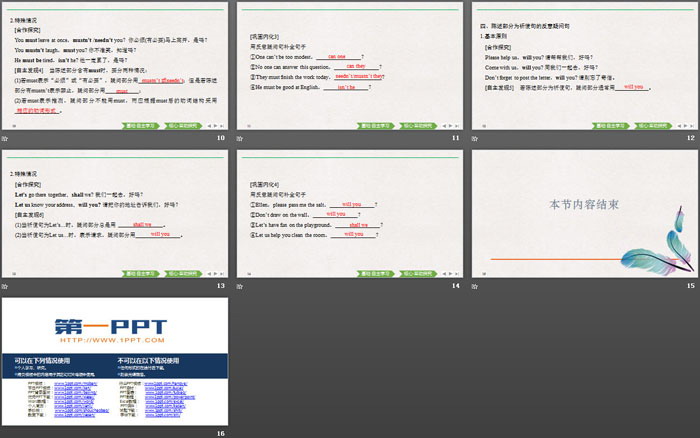北师大版(2019)英语必修第一册《Sports and Fitness》Discovering Useful Structures PPT下载
展开
《Sports and Fitness》Discovering Useful Structures PPT下载
语法整体突破
反意疑问句由“陈述句+简略疑问句”两部分组成,第一部分提出一种看法,第二部分用来质疑或表示证实。
一、基本用法与结构
[合作探究]
He likes English,doesn’t he?他喜欢英语,是吗?
He doesn’t like English,does he? 他不喜欢英语,是吗?
[自主发现1] 陈述部分与疑问部分的动词时态和动词性质应保持一致,而且肯定和否定形式彼此相反,即陈述部分为肯定式时,疑问部分用____________式,陈述部分为否定式时,疑问部分用____________式。
[名师提醒] 反意疑问句的回答:答语要和实际情况相符合,遵循“实事求是”的原则。肯定的答案用yes+肯定结构,否定的答案用no+否定结构。
A:You aren’t a teacher,are you? 你不是老师,是吗?
B:Yes,I am./No,I’m not.不,我是。/是的,我不是。
[巩固内化1]
用反意疑问句补全句子
①He bought a new book,________________?
②You haven’t finished your homework yet,______________________________?
③The songs in the movie “The Sound of Music” are really beautiful,________________?
二、特殊用法与结构
[合作探究]
He has few friends here,has he? 他在这儿几乎没朋友,是吗?
She said nothing,did she? 她什么也没说,是不是?
It is unfair,isn’t it? 这不公平,不是吗?
There was nothing in the room,was there?房间里什么也没有,是吗?
Everything is ready,isn’t it? 一切都准备好了吗?
I don’t think he will come,will he?我认为他不会来,是吗?
He thinks that she will come,doesn’t he?他认为她会来,不是吗?
[自主发现2]
(1)若陈述部分含有hardly,never,few,nothing,little,nobody,seldom等否定词或半否定词,其疑问部分要用____________式;
(2)若陈述部分含有带否定前缀的词,疑问部分仍用____________式;
(3)当陈述部分为there be句型时,疑问部分仍用____________作“主语”;
(4)当陈述部分的主语是 something,anything,nothing,everything等复合不定代词时,其反意疑问句的主语要用____________。
(5)当陈述部分是I think/suppose/believe that...结构时,其反意疑问句须与从句的主、谓语保持一致;主句的主语若非第一人称,则反意疑问句与主句的主语相一致。
[巩固内化2]
用反意疑问句补全句子
①Miss Li hardly has lunch at school,________________?
②Linda ate nothing this morning,________________?
③It is impossible,____________________?
④Usually there are at least two children in a western family,________________?
⑤Nothing is important,________________?
⑥I don’t think that you can do it,________________?
三、含情态动词的反意疑问句
1.基本原则
[合作探究]
He can speak English,can’t he?他会说英语,是吗?
We shouldn’t go,should we? 我们不应该去,对不对?
[自主发现3] 在通常情况下,当陈述部分含有情态动词时,疑问部分应________________________。
[名师提醒] 当dare,need 为实义动词时,疑问部分用助动词do/does/did+主语。She doesn’t dare to go home alone,does she?
2.特殊情况
[合作探究]
You must leave at once,mustn’t /needn’t you?你必须(有必要)马上离开,是吗?
You mustn’t laugh,must you? 你不准笑,知道吗?
He must be tired,isn’t he? 他一定累了,是吗?
[自主发现4] 当陈述部分含有must时,要分两种情况:
(1)若must表示“必须”或“有必要”,疑问部分用________________;但是若陈述部分有mustn’t表示禁止,疑问部分用____________;
(2)若must表示推测,疑问部分不能用must,而应根据must后的动词结构采用________________。
[巩固内化3]
用反意疑问句补全句子
①One can’t be too modest,________________?
②No one can answer this question,________________?
③They must finish the work today,_________________?
④He must be good at English,________________?
四、陈述部分为祈使句的反意疑问句
1.基本原则
[合作探究]
Please help us,will you? 请帮帮我们,好吗?
Come with us,will you? 同我们一起去,好吗?
Don’t forget to post the letter,will you? 请别忘了寄信。
[自主发现5] 若陈述部分为祈使句,疑问部分通常用____________。
2.特殊情况
[合作探究]
Let’s go there together,shall we? 我们一起去,好吗?
Let us know your address,will you? 请把你的地址告诉我们,好吗?
[自主发现6]
(1)当祈使句为Let’s...时,疑问部分总是用 ________________。
(2)当祈使句为Let us...时,表示请求,疑问部分用________________。
[巩固内化4]
用反意疑问句补全句子
①Ellen,please pass me the salt,________________?
②Don’t draw on the wall,________________?
③Let’s have fun on the playground,________________?
④Let us help you clean the room,________________?
关键词:人教版高中英语必修一PPT课件免费下载,Sports and FitnessPPT下载,Discovering Useful StructuresPPT下载,.PPT格式;



